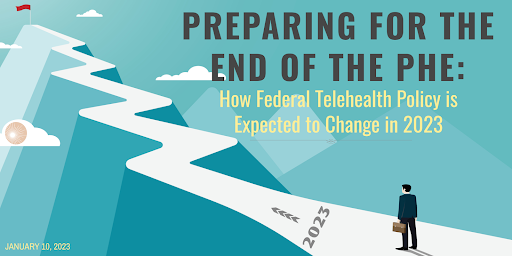Federal Telehealth Laws Post Public Health Emergency
Partner Content
Below is a summary from the Center for Connected Health Policy on the federal laws and regulations in place regarding telehealth, post the COVID Public Health Emergency.
What stays permanently:
Medicare reimbursement for eligible telehealth services when the patient is located in a geographically rural area AND in an eligible originating site (i.e. in most cases not the home).
Medicare reimbursement for mental health telehealth services (including audio-only services in some cases), provided that there is an in-person visit within the first six months of an initial telehealth visit and every 12 months thereafter (with certain exceptions). Implementation of this in-person requirement is delayed until Jan. 1, 2025. There is also an exception from the in-person requirement for substance use disorder treatment or a co-occurring mental health disorder and treatment for end stage renal disease.
Medicare reimbursement to federally qualified health centers and rural health clinics, although it will no longer be billed the same or for ‘telehealth’ specifically, for mental health services delivered via audio-only or live video. CMS has redefined a ‘mental health visit’ to now include encounters furnished through interactive, real-time telecommunications technology (which will include audio-only delivery in some cases) for a mental health disorder.
What stays on a temporary basis until Dec. 31, 2024, but will go away afterward:
Medicare reimbursement for telehealth services provided to patients at home, aside from certain exceptions.
Medicare reimbursement for an expanded list of eligible providers, such as occupational therapists, physical therapists, speech language pathologists and audiologists.
Medicare coverage of audio-only telehealth for non-mental health visits.
Reimbursement of FQHCs and RHCs as distant site telehealth providers for non-mental health services. As noted above, FQHCs and RHCs will continue to be reimbursed for ‘interactive, real-time telecommunications technology’ for a mental health disorder but these are not regarded as “telehealth” services for these entities.
Reimbursement of Medicare telehealth services not included in Medicare’s Categories 1, 2 or 3, will be allowed for a 151-day extension period (unless altered by CMS given the two-year extension of the other telehealth flexibilities) but will expire afterward. Includes codes such phone E/M codes 99441-99443.
Available through the calendar year in which the PHE ends:
Codes on Medicare’s Category 3 telehealth list [see page 3-4 of CCHP’s 2023 PFS factsheet for list], will remain reimbursable through the end of the year in which the PHE ends, likely extending it to Dec. 31, 2023. Some of these codes may eventually be incorporated into Categories 1 (services similar to services already on permanent telehealth list) or 2 (there is sufficient evidence to show service can be provided safely and effectively via telehealth) allowing for permanent Medicare reimbursement.
Virtual presence for direct supervision is available through the end of the calendar year the PHE ends, though CMS continues to consider comments regarding this issue for potential future PFS rulemaking.
What goes right away:
During the COVID public health emergency, HHS Office for Civil Rights (OCR) applied enforcement discretion to telehealth providers, allowing them to utilize any non-public facing remote communication product, even if they don’t fully comply with the requirements of the Health Insurance Portability and Accountability Act of 1996 (HIPAA). OCR has recently clarified in a FAQ document that the enforcement discretion will remain in effect until the Secretary of HHS declares that the public health emergency no longer exists, or upon expiration date of the declared PHE. OCR will issue a notice to the public when it is no longer exercising its enforcement discretion.
During the emergency, providers were able to prescribe controlled substances without an in-person examination. This flexibility will expire with the end of the PHE, requiring providers to adhere to strict rules. In most cases this will require a patient to be located in a doctor office or hospital registered with the DEA to be prescribed a controlled substance via telehealth. As mentioned previously, a proposed rule would create an additional permanent exception for prescribing buprenorphine in an Opioid Treatment Program (OTP), but has not yet been finalized.

